- Ice Cream Tree/Julius Caesar (Mercury MF 1066) 1968
Breakthru
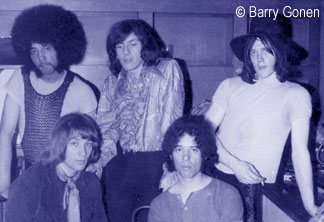
SUTTON COLDFIELD
Updated February, 2016
Keith "Smoke" Abingdon guitar, vocal
Gary Aflalo lead vocal, harmonica
Bob Booth bass guitar, vocal (left in 1968)
Geoff Garratley Hammond organ, vocal (left in 1969)
Jim Leyland drums (left in 1968)
Frank Farrell bass guitar, vocal (joined in 1968)
Richard "Plug" Thomas drums (joined in 1968)
Bill Hunt Hammond organ, vocal (joined in 1969)
"Psychedelic Soul!"
"Psychedelic Soul" was one name invented by reviewers in an attempt to describe the style of music performed by this high-energy West Midlands band. The Breakthru were a popular live attraction who came close to making the "big time" during the second half of the 1960s. Most of the former band members went on to have successful careers in the music industry.
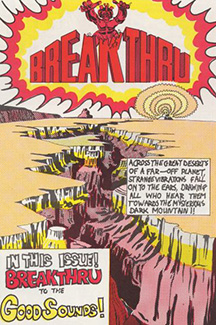
Breakthru were formed in 1967 as a professional group and were based in Sutton Coldfield. The members came from a couple of young semi-pro bands; 'The Clampets' who were an R&B band from the Kingshurst area of Birmingham, and 'The Set' who were a pop group from Castle Bromwich. The original members of Breakthru were Keith "Smoke" Abingdon (guitar), Bobby Booth (bass guitar), Geoff Garratley (Hammond organ), and drummer Jim Leyland. Breakthru were fronted by the charismatic and afro-equipped Gary Aflalo who more than filled the position of lead vocalist and front-man.
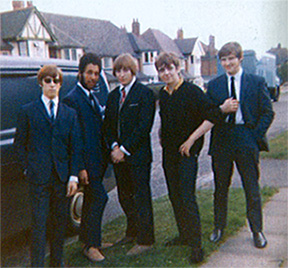
Gigs were booked by the Richardson Entertainments agency of Birmingham. The original concept of the band was to establish an exciting live act that would combine soul and Tamla standards with self-composed progressive music. Their guitarist Keith Abingdon said; "A lot of the bands around Birmingham at that time were harmony bands, or blues bands or soul bands so our live show was very different to all of them at that point. We mixed it all up into a sort of frenzy. A few of the old pros around at that time would say "They can't play too good but what an act!" Some reviewers who attended a Breakthru performance would describe the band's music as "Psychedelic Soul" which was probably a good description of it for that time.
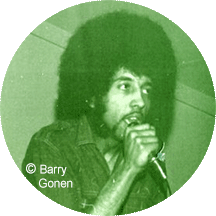
Lead singer Gary Aflalo recalled; "Where other bands were trying to play covers note for note, we weren't and were more intent on putting our own stamp of originality on songs. If you saw us play live you didn't forget us. There weren't too many progressive psychedelic white rock bands on the scene with a black front man who wasn't trying to be an Otis Redding or Wilson Pickett."
An essential part of Breakthru's live performance was their light show and pyrotechnics. You have to remember that in 1967 this idea was fairly new. "We built our own stage lights" said Keith Abingdon. "It wasn't the sort of thing you could buy in those days or we could afford. Colin Appleby (our roadie) was a real whiz-kid and really the extra member of the band so together we built the lights and a strobe. Colin would work the lights at the side of the stage using micro-switches so he could flash them on and off very fast."
"Just crazy and hard to believe now looking back!"
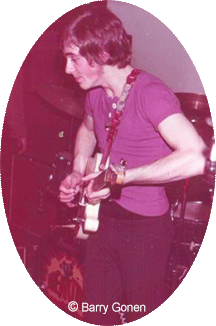
Keith; "We then got into using fireworks - these were outdoor fireworks, sort of small Roman Candles, giving off very bright green and blue light. The trouble was, a few times we had ones that gave off a flare that went shooting up to the ceiling. It's amazing to think we got away with it as long as we did. The worst thing that happened was when one of the fireworks dropped through a crack in the stage and started a small fire. Beer was tipped through the crack and luckily it went out. Just crazy and hard to believe now looking back!"
The Breakthru soon became a must-see live act who played most of the well known local venues in Birmingham and throughout West Midlands. They would also travel to bookings across the country. To get more work, the group developed different song sets that would better suit the audience or venue where they performed. For the workingmen's clubs, they played mostly covers of soul, ska, rock and blues. For the more prestigious gigs where they played support for other groups, the set would include a lot more original songs such as 'Adventure's Highway' and progressive covers like 'My White Bicycle' by Tomorrow.
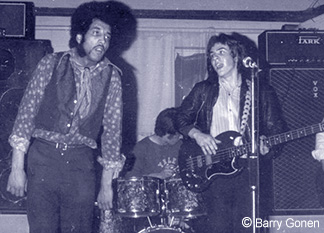
Though Breakthru were versatile, a disadvantage was that agents or reviewers might be confused as to the sort of band they were or in what musical direction they were going. Gary Aflalo said; "One night we would be playing pop, motown, reggae and soul songs at the JM Ballroom in Dundee. The next night could be playing progressive rock and blues at the Chateau Impney in Droitwich. This was great if all we wanted was regular work, but if we were hoping for someone to sign us as a band, they would be totally confused to what kind of a band we actually were."
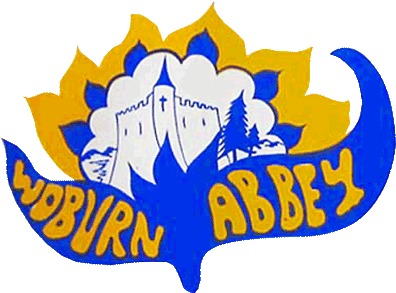
Despite the confusion, there was no doubt that Breakthru were achieving a lot within a short time and getting noticed by the right people. Prestigious engagements for the band included the famous London clubs The Marquee, Blaises, and Happening 44. In August 1967, they played at the now-legendary 'Festival Of The Flower Children' which was an outdoor "happening" held at Woburn Abbey. This three day event was headlined by such famous names as The Kinks, The Bee Gees, Eric Burdon, and The Small Faces along with fellow Brummies The Move and Denny Laine. The festival was hosted by the influential British DJ John Peel (film footage of this concert still exists). For more information, check out The Archive - an excellent website that profiles the great UK rock festivals from 1960 to 1975.
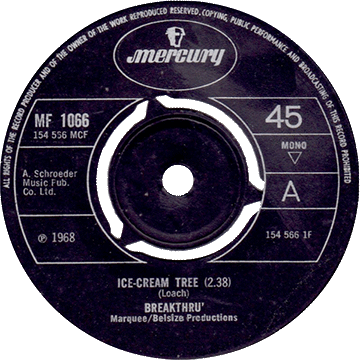
By late 1967, Breakthru were making their own recordings at Tetlow Recording Studio on the Stratford Road in Birmingham. All the band members contributed to writing songs for the band to record. They would also contribute backing for other local musicians recording there in exchange for free studio time. Geoff Garratley said; "As we gained in popularity, we were booked to do a number of live BBC Radio shows - notably 'Radio One Club' which we did on numerous occasions. Sometimes they required taped music for another BBC Radio 4 show which highlighted up-and-coming bands so we were asked to record at the BBC studios at Broad Street in Birmingham."
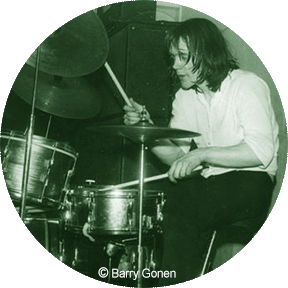
Despite the departure of drummer Jim Leyland and his replacement by Richard "Plug" Thomas, 1968 looked like the year Breakthru would indeed breakthrough into the big time. The group signed a contract with Mercury Records and went down to London to make their first single. Under direction of producer Mike Batt (later of 'Wombles' fame), Mercury had them record a song composed by Tom Loach titled 'Ice-Cream Tree'. The group were dismayed to discover the song was a rather light-weight pop effort and not at all the type of material they were used to performing on-stage.
"This was our first chance of having a hit record - never mind if it didn't represent what the band was about"
Geoff Garratley racalled; "We had very little choice in the matter or the arrangement which was alien to our normal style. We were just pleased to be recording and thought we would be able to go on to better material." Gary Aflalo explained; "The single Ice Cream Tree is another example of how naive we were at the time. This was our first chance of having a hit record - never mind if it didn't represent what the band was about. We were on-stage belting out progressive rock-blues with smoke bombs and flashing lights and here we were trying to get famous with a quaint little pop song."
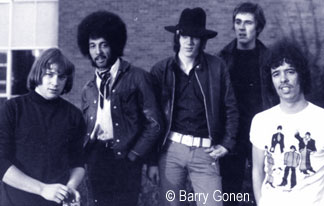
Released in November 1968, Ice-Cream Tree was annoyingly catchy enough to have charted at the time. The group did a good job on the recording along with the B-side titled 'Julius Caesar' composed by their manager. The band then had to go out and promote it. Keith Abingdon recalled; "We did a record signing at some record store in Birmingham with the record playing every five minutes, Aaaaarrgh!" The single didn't chart which may have been a relief for some of the group members who were now looking forward to recording an album that would best represent their sound.
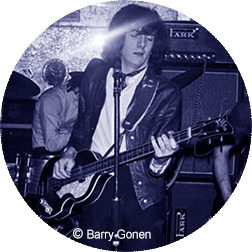
Towards the end of 1968, Bob Booth decided to leave Breakthru for a more financially secure future and was replaced by Frank Farrell on bass guitar. Frank was from Edgbaston, Birmingham and his first band was called 'The Silverlinks'. He turned professional with 'The Ray King Soul Band'. Gary Aflalo recalled; "Frank was a multi-talented musician and songwriter and Plug also wrote songs as well as being a good drummer. So here we were now with four songwriters in the band and three equally capable lead vocalists."
A proposed second Breakthru single titled 'The Story Of Peer Gynt' was recorded but remained unreleased as did the group-composed B-side called 'Troubleshoot'. The ambitious A-side combined elements of the classical composition 'Hall Of The Mountain King' and was composed by Frank Farrell. In addition to recording original songs for an album, Breakthru continued to introduce inventive covers for their live sets. This included their own rendition of 'Night Of Fear' by fellow Brum band The Move, and 'Sabre Dance' by Love Sculpture who were led by guitarist Dave Edmunds.
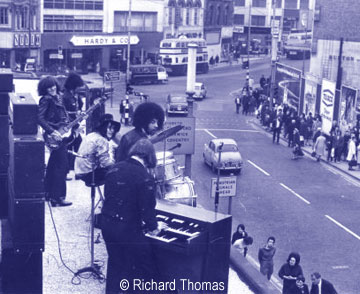
Although Breakthru had not broken into the record charts they were certainly busy. Their college and university gigs were always well-received but they still had to play the working mens clubs to make ends meet. Some of these clubs had strict rules regarding the level of volume allowed and would cut the stage power if the band played too loud. Keith Abingdon said; "One gig I remember as a disaster was a club where Frank Sinatra had played in Leeds. It was a massive club. When they thought you were playing too loud, they would turn the mains power down. The guitar amps didn't like this too much but the Hammond organ just dropped totally out of tune, whining and squeaking. The audience didn't know what was happening, we just sounded bloody awful!"
"The crowd were in need of some excitement and when we opened up they got some. They loved us, it was just fantastic"
One of the more unusual performances by the band was a gig played on the roof of Nelson House clothing shop to drum up publicity for the opening of the new store on Birmingham's Bull Street. On August 9, 1969, Breakthru performed at the three day highly-rated Plumpton National Jazz and Blues festival where they went down well with the audience and had good reviews. On the same bill that day were The Who, Fat Mattress, Yes, The Bonzo Dog Band, Roy Harper, King Crimson, and The Strawbs. West Midlands groups Chicken Shack and Idle Race were also included. Breakthru came on after Roy Harper performed a subdued acoustic set and the audience were ready for some volume. Richard Thomas recalled; "The crowd were in need of some excitement and when we opened up they got some. They loved us, it was just fantastic."
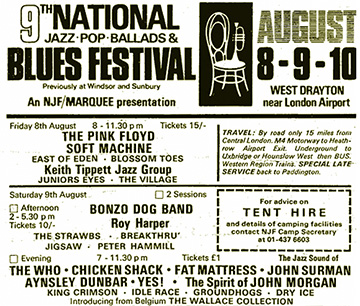
The recording of a proposed Breakthru album of original material for Mercury Records was well underway during 1969 but unfortunately nothing was released due to the cancellation of their recording contract. It was a bitter blow to the band who felt they had not been given the chance they deserved.
Breakthru were booked to play dates in Switzerland but before they went, Geoff Garratley decided to leave the band. He was replaced by classically-trained pianist Bill Hunt who was a graduate of the Birmingham School of Music. The group performed long hours at a club located in the 'red light' district of Zurich but the money was good and the audience loved them. They even got paid for an appearance in a German film shot inside a club where they mimed on-stage to a backing track. The band later found out it was for a porno film. Gary Aflalo recalled; "I remember walking along the NiederdorffeStrasse in Zurich with my huge afro hair, long RAF coat and red boots and all the traffic stopping in amazement!"
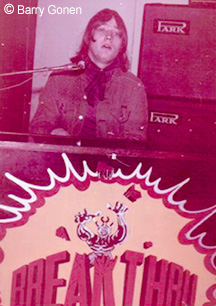
After playing a few more dates in France and Germany, Breakthru returned home but without their founding member Keith Abingdon who decided to stay in Switzerland with a girl he'd met and whom he later married. Gary Aflalo said; "The rest of us returned home knowing deep down that Breakthru was no longer." The group's place in Switzerland at The Hirschen Club was taken by another then-unknown band from Birmingham called Black Sabbath.
Without their lead guitarist and unable to find a suitable replacement, Gary Aflalo managed to get a part in the new musical 'HAIR' and moved to London with the rest of the band also deciding to relocate there. After a few months, Keith Abingdon finally returned from Switzerland but with Gary now occupied in his new stage musical role, Breakthru carried on as a four-piece. However, they continued to record in 1970 at Piccadilly Studios with Gary helping out on the recordings whenever he could.
Ironically, some of Breakthru's best recorded work was made during this period. Group written compositions such as 'Shake Off That Lead' and 'The Sailor Song' were certainly catchy and radio-friendly enough to have made a great single but unfortunately by this time, the group's momentum seemed to have been lost. In 1971, Gary Aflalo accepted another stage musical role in Andrew Lloyd Webber's 'Jesus Christ Superstar' and with the other members going on to new musical projects, Breakthru ground to a halt.
"Adventures Highway"
Frank Farell played bass guitar with the successful progressive rock band 'Supertramp' with whom he played on and contributed songs to their second album. He later worked with Leo Sayer co-composing his Number One hit record 'Moonlighting'. Frank Farrell passed away in 1997 at only 50 years old. Keith Abingdon carried on as a working musician and composer. Bill Hunt became part of the first line-up of Birmingham's world-famous 'Electric Light Orchestra' (see The Move) and later became a member of Roy Wood's chart-topping band 'Wizzard'. He is now a music teacher.
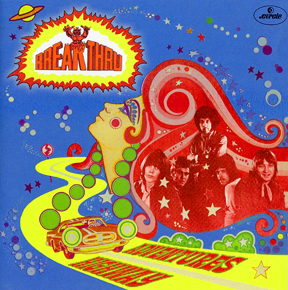
Richard Thomas moved to London and worked with American guitarist Joe Jammer before joining the respected prog-rock band 'Jonesy' with whom he recorded three albums. In 1974, Richard Thomas formed the group 'Gold' who were originally a pop act but later became one of the most successful bands to record advertising "jingles" during the 1980s. Richard also formed a recording group with former Breakthru band-mate Keith Abingdon called 'Spot The Dog' under which name they released a couple of good (though non-charting) singles during the early 1980s. They have also recorded some great original songs under the name of 'Smug'. Richard is still a full-time musician and song writer, also producing music for TV. To read more about Breakthru, visit the website of Richard Thomas at www.dickiethomas.co.uk
In 2007, Circle Records assembled and issued an extensive double-CD compilation of Breakthru's 1960s recordings including much unreleased material. Titled 'Adventures Highway' it is a fitting tribute to a fine Birmingham band who were in many ways ahead of their time.
Copyright © BrumBeat.net
Thanks to Richard Thomas for assistance in preparing this Breakthru biography and photographer Barry Gonen who has supplied wonderful photos of the band. Additional info and selected quotes from Circle Records Ltd. CD booklet by Mike Stax of Ugly Things Magazine, 2006.
To see a detailed review of Breakthru's 1960s recordings released on Circle Records, click HERE or visit the Circle Records web site at at: www.circlerecords.co.uk
Breakthru 1960s Record Releases
Singles:
If you would like to contribute to this page, please e-mail john@brumbeat.net
The Breakthru ALBUM REVIEW

The Circle Records company has released an album of previously un-issued 1960s recordings by the West Midlands group Breakthru. Until now, the band's recorded legacy was known only by a rare single 45 release from 1968. The group was never happy with the single as it was not a good representation of what their sound was like at the time.
Breakthru were known for performing exciting music while providing their own psychedelic light show to further enhance a larger-than-life image on stage and create for their audience a truly memorable experience. The group were certainly used to playing in front of large audiences as they performed at a number of outdoor music festivals during the latter part of the 1960s.
Breakthru were denied having an album of their own released despite all the members contributions of original songs - many of which were recorded by the group in various sessions between 1967 and 1970. Now - for the first time - you can hear these recordings in a wonderfully prepared package titled "Breakthru - Adventures Highway".
To see an in-depth review of Breakthru's 1960s recordings now released on Circle Records, click HERE for the Brum Beat "Reviews" page on this web site or visit the Circle Records web site at at: www.circlerecords.co.uk
Copyright © John R Woodhouse